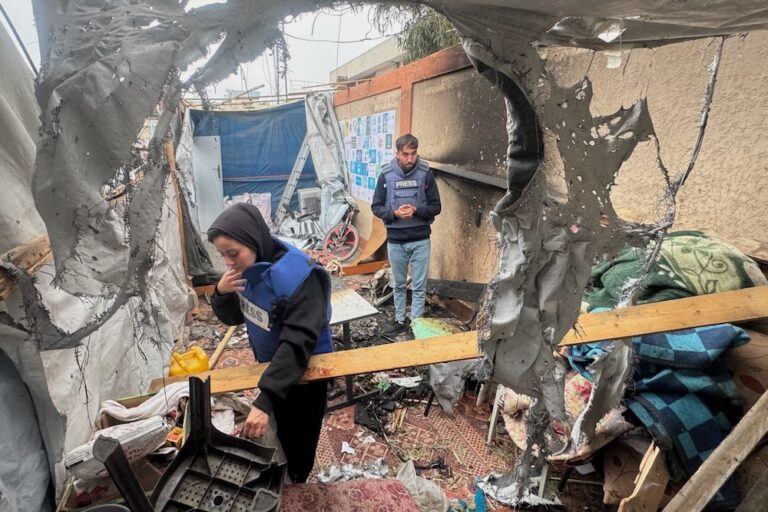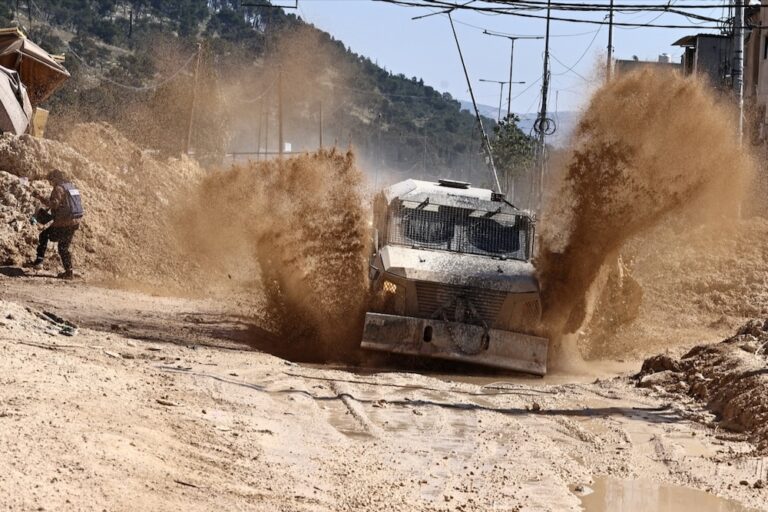(IFJ/IFEX) – The following is a 26 July 2006 IFJ media release, followed by a letter to Lieutenant General Dan Halutz, Chief of the General Staff, Israel Defense Forces: IFJ Presses Israel for Answers as Army Fires on TV News Crew in Gaza, Wounding Cameraman The International Federation of Journalists (IFJ) today condemned an Israeli […]
(IFJ/IFEX) – The following is a 26 July 2006 IFJ media release, followed by a letter to Lieutenant General Dan Halutz, Chief of the General Staff, Israel Defense Forces:
IFJ Presses Israel for Answers as Army Fires on TV News Crew in Gaza, Wounding Cameraman
The International Federation of Journalists (IFJ) today condemned an Israeli army attack on a Palestinian television news team in Gaza in which a cameraman was wounded – the sixth attack on media staff in the region in the last three weeks.
“Israel needs to investigate all of the recent attacks on media and it must eliminate this pattern of targeting,” said IFJ General Secretary Aidan White. “The appalling perception is of soldiers opening fire on unarmed journalists and of intimidation of Arab journalists to keep them from covering the news in the Palestinian territories and in Lebanon.”
Today, a Palestinian cameraman was wounded after Israeli forces fired on a news crew of Palestine TV east of the Gaza Strip. Cameraman Ibrahim al-Atlah was seriously wounded. According to reports, al-Atlah is now paralysed due to his injuries.
The latest attack raises new fears of mounting media casualties in the Palestinian territories and in Lebanon since the latest round of violence began.
Photographer Layal Nejib was killed on Sunday in southern Lebanon after an Israeli missile attack. She worked for Al-Jaras magazine as well as other media outlets.
Israeli air raids on Saturday hit transmission stations used by several Lebanese television channels and killed media worker Suleiman Chidiac, a technician working for the Lebanese Broadcasting Corporation (LBC). Two others were wounded in the strikes when relay stations for Future TV, Hezbollah-run Al-Manar television and LBC, the nation’s leading private network, were attacked by Israeli bombs.
Those air strikes followed the July 13 strike by Israeli helicopters on the Al-Manar headquarters outside of Beirut that wounded seven people, including a television employee. Israeli aircraft later attacked an Al-Manar transmission tower in eastern Lebanon.
Last week, Israeli forces in Nablus fired on a news crew of TV satellite channel Al Jazeera and injured technician Wael Tantous. On July 8, photographer Mohammad Az Zanoun was shot by Israeli forces as he took photographs in Gaza.
The IFJ has written to the head of the Israeli Defence Force, seeking an investigation into each of these cases. “It is imperative that we have answers about these incidents otherwise speculation about targeting media will persist,” said White. “The Israeli authorities must make it clear to military commanders that unarmed journalists and media are non-combatants. They must not come under fire.”
The IFJ represents over 500,000 journalists in more than 110 countries.
26 July 2006
Dear Lieutenant General Halutz,
On behalf of the International Federation of Journalists and our member unions all over the world, I am calling on you to investigate the recent attacks on media and journalists by the Israel Defense Forces.
By our count, there have been at least six attacks on media staff or structures since July 8:
– On July 26, Palestinian cameraman Ibrahim al-Atlah was seriously wounded after Israeli forces fired on a news crew of Palestine TV east of the Gaza Strip.
– On July 23, photographer Layal Nejib was killed in southern Lebanon after an Israeli missile attack.
– On July 22, Israeli air raids hit transmission stations used by several Lebanese television channels and killed media worker Suleiman Chidiac, a technician working for the Lebanese Broadcasting Corporation (LBC). Two others were wounded in the strikes when relay stations for Future TV, Hezbollah-run Al-Manar television and LBC, the nation’s leading private network, were hit by Israeli bombs.
– On July 19, Israeli forces in Nablus fired on a news crew of TV satellite channel Al Jazeera and injured technician Wael Tantous.
– On July 13, Israeli helicopters fired on the Al-Manar headquarters outside of Beirut, wounding seven people, including a television employee. Israeli aircraft later attacked an Al-Manar transmission tower in eastern Lebanon.
– On July 8, photographer Mohammad Az Zanoun was shot by Israeli forces as he took photographs in Gaza.
We must have answers about these incidents to erase any speculation that your forces are, in fact, targeting media staff. It is imperative that you make it clear to military commanders that unarmed journalists and media are non-combatants and must not come under fire.
An investigation is the only way to dispel the appalling perception that soldiers open fire on unarmed journalists and intimidate some Arab journalists to keep them from covering the news in the Palestinian territories and in Lebanon.
All professional journalists understand the need to be professional and not take sides in this conflict nor to inflame or incite further violence. With this in mind, it is essential that journalists and media, as non combatants, should be allowed as freely as possible to move, to observe and to report from the region.
The IFJ will assist in any way that it can with these investigations.
We look forward to receiving the results of your investigation and a response to this letter.
Sincerely,
Aidan White
General Secretary
International Federation of Journalists


